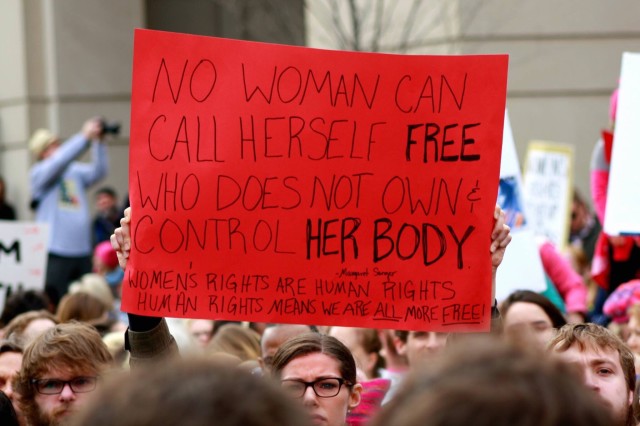“I didn’t want you to judge me,” was the reply I got from an old friend upon inquiring a few years ago, why she’d had an abortion. I had known her since primary school and, up to that moment, I thought we’d shared everything. It was disheartening to realize that she’d made a life-changing decision in such painful isolation. But this is the story of countless Jamaican women shamed into silence, forced to hide pregnancies lest they be accused of immorality, infidelity, or worse. Both by their partners, and the larger community which ascribes to abortion with such chilling phrases as ‘dash weh belly’ or ‘walking cemetery’.
Any attempt at reasonable discourse is met with profound irrationality, largely designed to create tension and stall the debate. Jamaica has some of the most restrictive abortion laws. The 155 year-old Offences Against the Person Act; a gift from its colonizers, criminalizes abortions for both women and the professionals who perform them. Reproductive rights activists are outraged by the church’s role in lobbying for the retention of such draconian laws.
A report by the Guttmacher Institute, found that an estimated 36 abortions occur each year per 1,000 women aged 15–44 in developing regions, compared with 27 in developed regions between 2010 and 2014. Thus women in developing countries have a greater likelihood of getting an abortion. However, the same report stated that 93% of countries with highly restrictive abortion laws are in developing regions. Most recently, Alabama passed its Human Life Protection Act which bans almost all abortions, making the United States of America much more hostile to abortions than other developed, or developing, countries. This also shows a strong correlation between conservatism, religion, and attitudes towards abortion.
Jamaica is a predominantly conservative fundamentalist Christian society. Its underpinnings are essentially patriarchal, traditional, and religious philosophies. So we should not be surprised that the church is heavily invested in the status quo; in keeping things as they are. Almost all of the headlines, sound-bites we’re exposed to reflect the church’s stance on abortion. Their ideological and moral bases for preserving an archaic law make it difficult for discussions of any kind. Jamaica is not a theocracy, purportedly, and yet religion hinders any legislative attempt at addressing the issue of reproductive rights.

Persistent Judeo-Christian views on abortion continue to undermine women and their right to choose. As such, women are forced underground where risk to their health increases in proportion to the mania surrounding the issue. According to Gordon-Strachan (2009), certain social realities increase the risk of unwanted pregnancies. These include poverty, a high rate of illegitimacy and single parenthood, early sexual initiation, and teen pregnancies.
In early societies, abortion and infanticide were mostly a necessity to ensure survival of the clan, or the many. Women used plants as contraceptives to limit number of children, and painful miscarriages. There was no “moral barrier to these choices because children were considered fully-fledged people when they reached sexual maturity” (Nünning, 2017). Women die from unsafe abortions, yet the church has continued to use power and control to justify its position over women’s bodies. Its apparatus is fear and the most effective method of control is via the body.
If we understand the church’s need to uphold this doctrine of control, then the reasoning will start to make sense. The restrictions on abortion are one of many tools used to keep women subservient to the patriarchy. The church is also an extension of colonialism: “it does not call the colonized to the ways of God, but to the ways of the white man, to the ways of the master, the ways of the oppressor” (Fanon, 1961). The church is not pro-life or pro-children and it uses obscure biblical passages to shore up its position against abortion. Of the more than six hundred Mosaic laws, none provide any commentary on abortion. Its intent is against women, and its biblical bases for abortion smacks of desperation.
Bans, limitations, and control of women’s bodies are evident in all world religions, and the Christian church is no exception to this politicisation. Fear is what drives the antiabortion crusade – fear of the unfamiliar, of women; in the guise of religious practices, community mores, and standards observed and instituted by a patriarchy now thousands of years old.
Access to safe abortions is a human right, and, governments should be protecting women and their sexual and reproductive health choices. Complications from abortion are rare when performed by skilled health care providers in sanitary conditions, but unsafe abortions pose a high risk of maternal and infant deaths. Restrictive policies increase the risk of unsafe abortions, and are associated with higher rates of injury and death.
Jamaicans are proud to espouse theirs is a Christian nation, and no one would argue since it has the most churches per square mile. Yet I would argue that the social malaise affecting the population is significantly impacted by widespread religiosity. The church seems to have no impact on rising incidents of violence, rape, robberies, etc. Separation of church and state is fundamental to human rights, and therefore a woman’s right to choose. Abortion is, and must be a woman’s prerogative, and public policy is not the dominion of priests.
